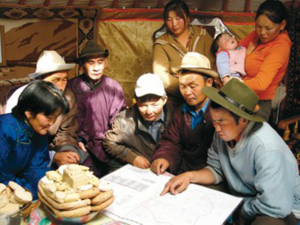ID :
345294
Tue, 10/21/2014 - 13:17
Auther :
Shortlink :
https://oananews.org//node/345294
The shortlink copeid
“LEAVE NO ONE BEHIND: THINK, DECIDE AND ACT TOGETHER AGAINST EXTREME POVERTY”

Ulaanbaatar /MONTSAME/ Deputy Resident Representative of United Nations Development Programme in Mongolia Mr Thomas Eriksson published last Friday an article on the UNDP website regarding reducing a poverty rate in Mongolia.
“Globally, the number of extreme poor has dropped by 650 million in the last three decades, a level of progress humankind had never seen before. Similarly, in Mongolia, poverty has been significantly reduced. But still there are more than a billion people living in extreme poverty around the world and poverty in Mongolia remains too high at 27.4 percent.
"On 17 October each year, the International Day for the Eradication of Poverty, people of the world are invited to demonstrate solidarity with people living in poverty.
"People living in poverty face a multifaceted reality. It is not simply a lack of adequate income; it is a cruel mix of human deprivation in food, decent housing, health, knowledge, dignity and rights as well as obstacles to participation and lack of voice. It is a lack of freedoms, opportunities and choices.
"Economic growth alone will not produce jobs and cut poverty unless it is inclusive and equitable, and unless the needs of the poor and marginalized are at the centre of development priorities. When men and women have equal opportunities and freedoms, economic growth accelerates and poverty declines more rapidly. It therefore makes good business sense to invest in eradicating poverty.
"Eradicating poverty is neither quick nor easy. Many think that the solution is to give cash hand-outs. To eradicate poverty is to provide people with choices and opportunities and to allow for equal participation. It is a people based change agenda addressing the social, cultural and economic conditions that created poverty in the first place. The agenda starts from the perspective of the poor and building their resilience and reduce their vulnerabilities; promote employment and decent work for all; provide equal access to education, health care and social services; invest in gender equality; and implement social protection programmes targeting the most vulnerable. This agenda also require a focus on the long term agenda of climate change to mitigate its impact and help people, especially the poor, to adapt.
"Mongolia has recorded among the highest economic growth rates in the world in recent years. Mongolia’s economy has grown at an average annual rate of 8 percent since 2000 and in double-digits for three consecutive years in 2011-13. Mongolia is now classified as a middle-income country and a country with medium human development. Despite this extraordinary progress, poverty continues to be high and the share of the bottom quintile in national consumption has not changed since 2000. Disaggregation of data also reveals wide disparities across income quintiles and regions on most Millennium Development Goal indicators. There is evidence that there is a rapid concentration of wealth in a very small segment of society. Inequalities are also observed between rural, urban and peri urban settings.
"To give a practical example: Water, sanitation and heating are vital components of sustainable development and the alleviation of poverty. The poor and vulnerable in Mongolia, such as recent migrants to Ulaanbaatar living in ger districts, pay more for such basic services than the better off who live in apartments with centralized heating, water and sanitation which is subsidized. Studies show that ger district dwellers pay 16 times more per heating unit per square meter as compared to apartment dwellers. Many countries around the world have introduced free electricity, water, heating, sanitation for the population that consumes below a threshold level subsidized by those who consume much more. Such policy reverses the subsidy and has the power to lift people out of poverty.
"The theme of this year’s poverty day, 'leave no one behind: think, decide and act together against extreme poverty', points to two key issues. Firstly, to eliminate discrimination and exclusion based on poverty, gender or economic and social status and to focus attention on the most vulnerable. This is a human rights agenda. Secondly, it points to the need to include people living in poverty as equals in shaping their development agenda. Only by creating a partnership with people living with poverty will it be possible to create a world where all people can enjoy decent lives and have a place in their communities. In Mongolia, strengthened local governance is an important part of poverty eradication. The role of the Khurals at the most local level in listening to the poor, in engaging the poor and in truly representing the poor is crucial. This would be a genuine partnership with people living in poverty. It also requires engagement with the generations to come, the youth, what kind of country do they want to live in?
"On this poverty day, UNDP urges Mongolia to take on the challenge of eradicating poverty. A national poverty eradication strategy focusing on the most vulnerable people in Mongolia integrated into the national development agenda is needed. This is a positive agenda for change. It has as its overarching objective the creation of opportunities that eradicate poverty, exclusion and inequalities for all Mongolians. Such focus should go hand in hand with an economic growth agenda. This strategy should take its starting point in a thorough understanding of the face of poverty in Mongolia and make poverty eradication everyone’s business, not only something that the poor or the social workers should deal with. As there is no quick fix, it requires all sectors of society and government to work together. First and foremost what is needed is a true commitment to eradicate poverty from Mongolia."





